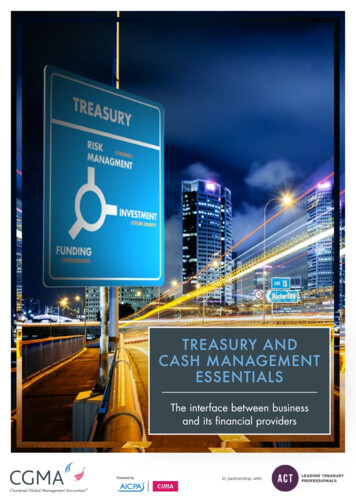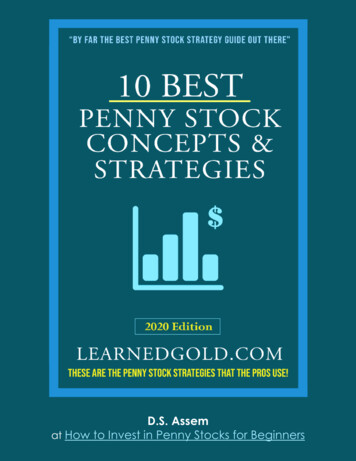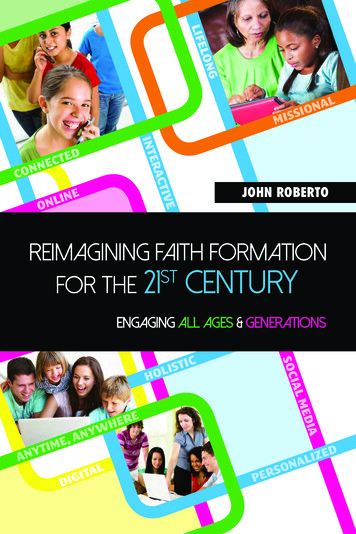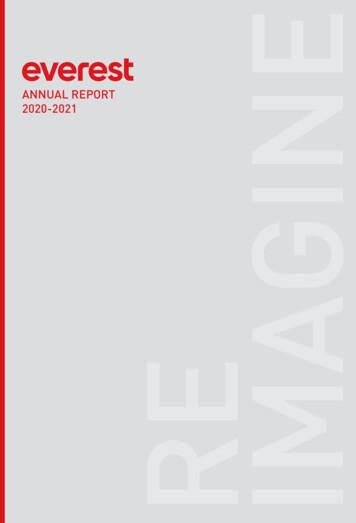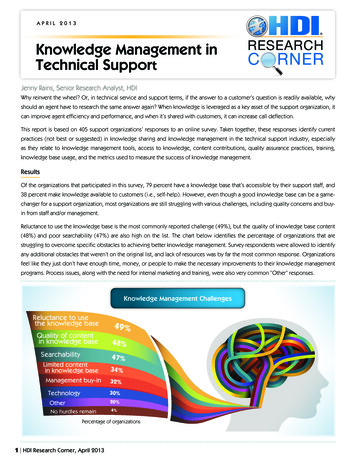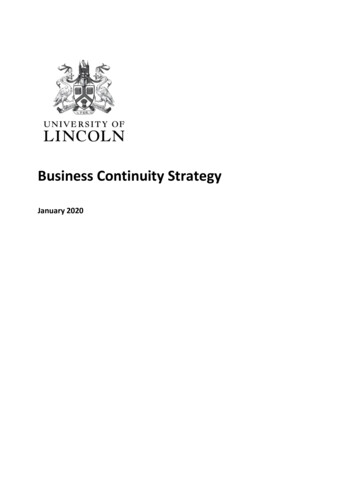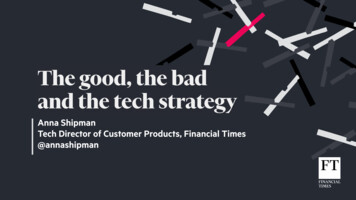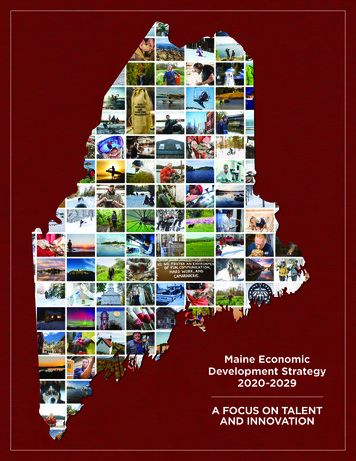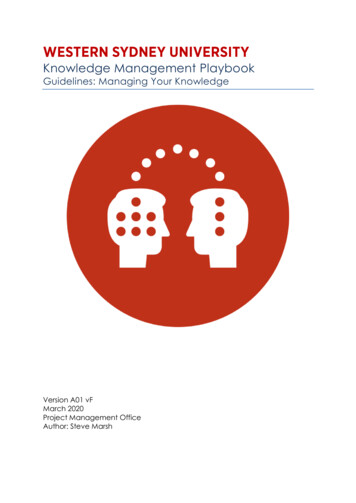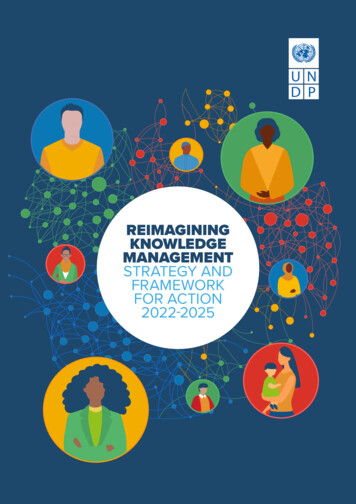
Transcription
REIMAGININGKNOWLEDGEMANAGEMENTSTRATEGY ANDFRAMEWORKFOR ACTION2022-2025
TABLE OFCONTENTSVISION4PART ONE – LANDSCAPE6PART TWO – INTERNAL ALIGNMENT12PART THREE – KEY OBJECTIVES15PART FOUR – GOVERNANCE ARRANGEMENTS34ANNEXES35
REIMAGININGKNOWLEDGEMANAGEMENTSTRATEGY ANDFRAMEWORKFOR ACTION2022-2025MARCH 2022UNDP aspires to be a world-class knowledge leader and seamlessVISIONknowledge sourcing and sharing entity. The KM Strategy is a call to action:to establish and align the systems, incentives, culture, and resourcesneeded to move the needle on the 2030 AgendaPART ONEPART TWOPART THREEPART FOURANNEXESLandscape highlights global research, previous knowledge managementinvestments and innovation in knowledge management to inform UNDP’sdirection.Internal alignment outlines the related organizational investments plannedunder other corporate strategies in line with the current Strategic Plan.Key objectives establishes the focus of the knowledge managementstrategy, drawing from global best practice, leveraging current investmentsand past lessons.Governance arrangements sets out current and proposed functions andan enhanced knowledge management architecture and governancearrangements.Separate document.
VISION
UNDP aspires to bea world-class knowledgeleader and seamlessknowledge sourcingand sharing entityUNDP’s Strategic Plan needs to come to life inaround the world with access to an ecosystem170 countries and territories, including throughthat fosters knowledge generation and sharingknowledge generation and sharing. This is notaligned with common principles and values.an academic exercise. It is about establishingthe right systems, incentives, culture, and re-The KM strategy also acts as connective tissue,sources to move the needle on the 2030 Agenda.leveraging critical institutional investments indigital, data and people towards the ambition ofThe knowledge management (KM) strategy ad-the 2030 Agenda. Recognizing that knowledgevances an approach to knowledge that embedsexists in varied forms across the organization,development impact with a sense of purpose.the strategy calls for a minimum consistentThis approach to knowledge management isinfrastructure to activate knowledge collabora-both quantitative and qualitative, collabora-tion and peer-learning, increased coordination,tion-based and curiosity driven. Designed in thestandardized common processes, and seam-third year of the COVID pandemic, this strategyless collaboration among headquarters, regions,reflects our learning as an organization, and crit-and country systems.ical role of knowledge-based coalitions to drivechange.Amplifying UNDP’s hyperlocal to global reach,the knowledge strategy reflects a need forValues and culture, together with a commongreater tailoring to peoples and places andsense of purpose, create the space for suchstrategic focus. Aligning to the ambition of thecoalitions to flourish. Our knowledge systems2022-25 Strategy Plan, the KM strategy situatesmust connect with leading external knowledgeknowledge as a critical enabler for an agile, pur-and learning and provide UNDP staff memberpose-led, and responsive organization.REIMAGINING KNOWLEDGE MANAGEMENT STRATEGY AND FRAMEWORK FOR ACTION 2022-20255
PARTONELANDSCAPEREIMAGINING KNOWLEDGE MANAGEMENT STRATEGY AND FRAMEWORK FOR ACTION 2022-20256
LANDSCAPEKnowledge will continue to be a key differenti-relevant – and organizational advancementator in driving organizational performance andcomes from contributions to personal and or-development impact. UNDP currently holds aganizational reinvention2 – is a critical elementcomparative advantage in specific knowledgeof an effective KM Strategy.niches: granular insights into how developmentworks on the ground; inter-disciplinary learningsThis raises both cultural and technologicalinto how integrated action leads to developmentquestions for the future of KM in UNDP. At aimpact; and increasingly a future-oriented per-time when global megatrends, such as pan-spective that encompasses digital and greendemic preparedness, resilience to climatetransformation across the developing world.shocks and the fourth industrial revolution,need to be addressed in diverse developmentHowever, deepening and connecting knowl-contexts, KM systems and capabilities becomeedge niches requires a sharper proposition oninvaluable. Yet, as the deepening inequities andhow we derive value from knowledge, use it tounfolding human and ecological crises attest,forge partnerships, and apply it as a driver ofwe remain ill-equipped to achieve the meansdevelopment impact. While technology is anof implementation called for by the 2030 Agen-enabler, leading global surveys1 show that ef-da. Despite the consensus and re-articulationfective knowledge management requires humanof the need for more meaningful knowledgesolutions to bridge organizational silos, createco-creation, sharing and application, the focusincentives for collaboration and ensure a robustof our attention and resources fail to mirror theorganizational mandate for knowledge.rhetoric.Values and culture, together with a commonSolutions to these development challenges aresense of purpose, create the space for knowl-developed and tested in many places. UNDPedge collaboration and its application to flour-needs to become more connected with knowl-ish. Many individuals feel that holding ontoedge centers, both in the Global North and Glob-their knowledge allows them to safeguard theiral South, so that our knowledge can benefit oth-worth. So, cultivating an ethos where people feelers and we can bring to bear the best thinking inthat sharing their knowledge makes them moreour pursuit of results.1 Deloitte Insight The-new-knowledge-management.pdf2 TobyLowe-PMAconferencepaper-FINAL.pdf (humanlearning.systems)REIMAGINING KNOWLEDGE MANAGEMENT STRATEGY AND FRAMEWORK FOR ACTION 2022-20257
Corporate lessons and feedbackon knowledge managementKnowledge management in UNDP has been for-knowledge management strategy and the em-malized over the past twenty years and is char-phasis on knowledge facilitation and learning.acterized by a history of promoting knowledgeThe global policy centers were seen to have po-networking, knowledge production, public dia-tential to facilitate knowledge exchange acrosslogues, mapping expertise, and learning throughand outside UNDP. It also noted limitations inprogramming. The aim has been to strengthenharnessing knowledge and the systematic ap-UNDP’s role as knowledge broker, builder ofplication of knowledge and lessons to improvecapacities and facilitator of exchanges, includ-results at the country level. Particularly in areasing on South-South and triangular cooperationof SSTC, where knowledge partnerships play(SSTC).a significant role, stakeholders’ perception ofUNDP as a partner of choice dropped by halfThe 2018 Manifesto3 established the Globalbetween 2017 and 2020.Policy Network (GPN) and reimagined the policy function in UNDP. Considering the new sixThe evaluation of the Strategic Plan 2018-21cross-cutting Signature Solutions, it was a re-highlighted the investments in the Acceleratorsponse to challenges in UNDP’s capacity to pro-Lab network and the Digital Strategy. However,vide development advisory services. Knowledgeit also pointed out the need to enhance learningwas seen as key to the revitalized policy functionand skills of programme personnel to use morethat “must better capture the knowledge, inno-complex approaches in support of countries’vation and best practice from country, regionalpursuit of the Sustainable Development Goalsand global experience”. The primary purpose of(SDGs). Many recommendations contained inthe policy function was deemed to “deliver theprior evaluations on KM were never acted upon.knowledge needed for UNDP’s work”. This KMStrategy builds on that experience; however, theThe latest assessment by the Multilateral Or-challenge remains formidable as evidenced byganization Performance Assessment Networkinternal and external feedback.4(MOPAN) assessment highlighted the supplyside of KM, for instance the establishment ofA frank assessment of successes and chal-Communities of Practice (CoPs); however, itlenges is essential for any improvements tofound the horizontal and vertical exchange oftake root. The evaluation of the Strategic Planknowledge within UNDP, including between the2014-17 highlighted UNDP’s comprehensiveGPN and the Human Development Report Office3 The Manifesto – Policy without Borders, Policy beyond Borders, 10 April 20184 See: Global Staff Survey (2020); Partnership Survey (2020); Evaluation of the UNDP Strategic Plan and Global and Regional Programmes(August 2017); Evaluation of the UNDP Strategic Plan 2018-2021 (March 2021); MOPAN Assessment Report (November 2021)REIMAGINING KNOWLEDGE MANAGEMENT STRATEGY AND FRAMEWORK FOR ACTION 2022-20258
(HDRO) and with other UN entities, lacking. Athe sustainability of knowledge in UNDP. This2020 Joint Inspection Unit evaluation5 of learn-equally applies to knowledge contained in doc-ing platforms across the UN system found thatuments, as well as tacit, undocumented knowl-their alignment with thematic business unitsedge which resides in our development experts.nurtured the emergence of thematic silos andthat internal hierarchies and political sensitivitiesfavor private knowledge sharing, with broaderinteraction limited to highly processed knowl-Communities of Practice (CoPs)edge products.CoPs provide a critical peer learning spaceUNDP personnel and partners have reflectedon their experience with KM in recent surveys,workshops, and interviews. Many are currently unable to easily access the knowledge to dotheir work and rely on external platforms andoffline conversations to find what they are looking for. The large number of ‘one-off’ knowledgeand information systems, many built to fill a specific gap or need, lack cohesion or connectionto one another. They contain partial personneldata, and a comprehensive mapping of expertise and experience is lacking.The 2020 Global Staff Survey (GSS) found anincrease in offices and teams collaborating effectively, compared to 2018. However, the needto enhance a culture of learning and knowledgesharing remains of critical importance. Significant opportunities exist, for example, to systematically connect SSTC knowledge and development solutions to wider knowledge networks– KM in support of SSTC was seen less thanfavorably by 42 percent of GSS respondents.Most knowledge emanates from projects witha limited lifespan, which creates challenges forwhich connects experts and knowledge acrossa distributed workforce. The CoPs were firstlaunched in 1999 as email networks and became a cornerstone of UNDP’s global policyand programme function, connecting practitioners across regions, flattening hierarchies,and increasing knowledge exchange and learning among personnel. The CoPs transitioned toTeamworks, a homegrown knowledge platformdeveloped in 2009, which introduced a cultureof virtual, democratized knowledge sharing. In2015, UNDP moved from Teamworks to Yammer which offered a social networking spacethat scaled down knowledge networks.The latest iteration of CoPs was launched inFebruary 2019 as part of the GPN. The platformSparkBlue, launched in 2020, houses the CoPsand has become the home for public dialoguesand engagements, – and is in high demand byUN agencies, Member States, and other partnersfor knowledge collaboration. The CoPs offer animportant opportunity to re-balance internal hierarchies and political sensitivities which have,across the UN system, tended to favor privateknowledge sharing.65 JIU/REP/2016/10 u document files/products/en/reports-notes/JIU%20Products/JIU REP 2016 10 English.pdf6 Ref JIU report on UN learning systems (details to be added)REIMAGINING KNOWLEDGE MANAGEMENT STRATEGY AND FRAMEWORK FOR ACTION 2022-20259
Regional investments inknowledge platformswithin regions, the challenge is to better con-These have increased staff access and interac-particularly in relation to complex challengestion, serving as hubs for project level informa-that require a diverse set of partners.nect and combine data for new insights that isavailable across regions and regional teams,tion and relevant data on development issues.The KM gateway managed by the Regional Bureau for Europe and the Commonwealth of Independent States (RBEC) supports knowledgestorage and has piloted a region-specific dashboard on SparkBlue to curate and amplify mostrelevant knowledge for specific developmentMaintaining high qualityknowledge productsThe corporate Knowledge Product Quality Assurance process introduced in 2018 ensurescontexts.that important aspects are being observedThe Knowledge Gateway managed by the Re-diligence, and clear accountability. It is com-gional Bureau for Africa (RBA) provides information at a glance about resources, publications,contact information and country-specific documents. The Arab Development Portal is an online one-stop-shop with credible and timely dataand knowledge resources for the region. The innovative data investments and expert partnerdatabase managed by the Regional Bureau forLatin America and the Caribbean (RBLAC) connects leading think tanks, academia, and top-level expertise to serve the needs of the region.The Knowledge Hub managed by the RegionalBureau for Asia and the Pacific (RBAP) connectsduring development, including standards, dueplemented by a knowledge product feedbackand measurement system to gain insights intothe perceived value of our knowledge products,UNDP’s thought leadership and understandingof our audience. Almost half a million contactshave been collected from readers of UNDP’spublications, with 16,500 having provided detailed feedback on the publications. UNDP iswell-regarded as a source of valuable and tailored knowledge products, according to AidData7. Human Development Reports are morewidely read than any other development reportin the multilateral system.thought leadership, experts, and Country Officeexpertise.Regional initiatives to collect and distill insightsto support evidence-based policy choices enhance corporate data sources and build newexpert collaborations with academia, thinktanksand thought leaders. While invaluable resources7Global public dialogues andcitizen engagementGlobal public dialogues as a UNDP service wasfirst launched via Teamworks in 2012, combining an online platform and facilitation supportAidDataREIMAGINING KNOWLEDGE MANAGEMENT STRATEGY AND FRAMEWORK FOR ACTION 2022-202510
for UN agencies and development partners tomanage large-scale global consultations. WithAccelerator LabsTeamworks’ decommission in 2015, that ser-With the launch of the Accelerator Lab Networkvice was strengthened through successor plat-in 2019, UNDP set out to reimagine sustainableforms like Global Dev Hub and now SparkBlue.development and configure new ways of work-These public dialogues and the accompanyinging. By accelerating learning, creating actionableadvisory services have contributed to UNDP’sintelligence and test solutions with national part-reputation as a trusted knowledge broker andners, the 91 Accelerator Labs are supporting 115convenor. In fact, the design of the SDGs wasCountry Offices to make greater impact towardssupported by “The World We Want”, a globalthe SDGs. A key driver of UNDP’s ambition tocitizen engagement led by UNDP’s post 2015connect hyperlocal to global, the Labs play aKM team. To date it’s the largest crowdsourc-critical role in exploring methods and systemsing of development needs that fed into globalto enhance collective intelligence, includingcommitments.the sourcing, and sharing of tacit knowledge.REIMAGINING KNOWLEDGE MANAGEMENT STRATEGY AND FRAMEWORK FOR ACTION 2022-202511
PARTTWOINTERNAL ALIGNMENT
INTERNALALIGNMENTThe KM Strategy directly contributes to the am-The Digital Strategy 2022-2025 guides UNDPbition set out in the UNDP Strategic Plan 2022in its efforts to support countries to build inclu-– 2025, including its Signature Solutions andsive, ethical, and sustainable digital societies. Itthe pursuit of ’moonshots’. It supports a cultur-builds upon the Strategic Plan and puts forth aal shift that is data driven, tackles complexity,vision whereby digital is an empowering forcenavigates uncertainty and actively managesfor people and planet.risk. An optimized knowledge flow with robustlearning systems that connect across diverse Efforts are underway to streamline our digi-development settings is a critical enabler of thetal ecosystem where external, programmat-risk-informed and agile management UNDPic, and operational data and knowledge isseeks to advance.recorded, codified, curated, and disseminated to connected to profiles, achievements,This strategy and its implementation deliver ondeployments, and learning.knowledge outputs listed under Organizational Effectiveness and Efficiency (Tier 3) in the Investments in the right infrastructure areIntegrated Results and Resources Frameworkneeded that support collaboration and the(IRRF)8. The KM Strategy complements andeasy sharing of knowledge. The implemen-benefits from corporate investments pursuedtation of Quantum, together with other ef-under other flanking strategies and will lever-forts, present an important opportunity toage relevant strategies and policies that havereassess UNDP’s current business modelbeen insufficiently applied by UNDP. Connectingthat creates siloed domains in every coun-knowledge priorities with the investments guid-try with their own business unit, own proj-ed by UNDP’s digital, data and people strategiesects, own resources, and own staffing. Torequires an alignment of the teams responsibleachieve the seamless flow of knowledgefor its application, mapping and identifying syn-across UNDP requires that we move awayergies and consolidation of existing knowledgefrom a culture where every country office isplatforms, unified user profiles and sharpeninga closed off unit and instead collectivize allknowledge curation with AI backed solutions.our assets.8In particular the KM Strategy contributes to output 3.1.1 on quality programmes, 3.3.1 on knowledge, and 3.3.2 on the quality ofevidence.REIMAGINING KNOWLEDGE MANAGEMENT STRATEGY AND FRAMEWORK FOR ACTION 2022-202513
The Data Strategy enables UNDP to leverageusage. Investment in workplace culture sup-data as a strategic asset with consistent, trans-ports our staff to listen at speed, digest, andparent standards for analysis and collection. In-act rapidly on issues before they escalate investments, for example in a centralized custom-turn creating an environment where staff feeler relations management system, will enable thevalued and heard.real-time coordination of strategic engagementwith UNDP’s partners at any level, in any place,The IT Strategy aims to deploy new ways ofon any topic.working and collaborating by providing easy touse and intuitive tools and technologies that are UNDP’s first unified data hub was finalized insecure and provide reliable access to informa-2021 and several data pipelines are currentlytion for better and more timely decision-mak-underway, as part of UNDP’s Data Strategy.ing, delivering results. Efforts are underwayIn 2022, ATLAS is slated to be replaced byin providing a fit for purpose, high quality, andQuantum, which promises to enhance da-cost-effective operational backbone, togetherta-driven decision making by consolidatingwith smart facility services.data sources, improving data integrity, andenhancing reporting capabilities.The Evaluation Policy lists learning and betterdecision-making as its first purpose: “A strongThe People for 2030 Strategy focuses on theculture of evaluation is a prerequisite for a learn-skills and competencies to respond to develop-ing organization.” Efforts are underway to makement challenges of the future with a key focusthe lessons and findings contained in evalua-on ensuring UNDP is progressively transformedtions more accessible and searchable.into a learning organization with a culture ofcontinuous learning. COVID-19 has highlightedThe Risk Appetite Statement for the first timethat ‘people’ is UNDP’s greatest asset, and theirsets out a corporate position on risk-taking incontribution in an inclusive work culture freesupport of a more risk-enabled culture in UNDP.form all forms of discrimination, exploitation,The organization continuously takes risk to deliv-or abuse.er its programmes, and knowledge of past successes and failures are instrumental for risk-in- New investments in digital, data and financialformed decision-making. Efforts are underwayliteracy, building and attracting capacities toto better link enterprise risk management withmanage uncertainty, risk, and complexity willan organizational culture of continuous learningenhance knowledge generation, sharing andas part of the programming cycle.REIMAGINING KNOWLEDGE MANAGEMENT STRATEGY AND FRAMEWORK FOR ACTION 2022-202514
PARTTHREEKEY OBJECTIVES
KEYOBJECTIVESUNDP aspires to be a world-class knowledgemeaningful action and impact. Connecting theleader and seamless knowledge sourcing andorganization vertically and horizontally, the strat-sharing entity. The KM Strategy aims to createegy is advanced through three key objectives,a system of knowledge and a culture of learn-which advance knowledge generation (Objectiveing that detects the challenges of the future inOne); knowledge sharing (Objective Two) andreal time and provides a robust foundation forknowledge application (Objective Three):OBJECTIVESPRIORITYACTIONSGenerate world-classthought leardershipon emergingdevelopment issuesShare knowledgethrough dynamicnetworks that drivea culture of learningApply knowledgeacross developmentportfolios to sharpenresults and impactEnhace R&D capabilitiesto identify trends,frontier challenges anddevelopment futuresCurate, share andposition UNDP’slearning to meetdevelopment needsEmbed knowledgein RBM for fasterlearning, improvedresults, and impactRobust knowledgequality standardsimprove rigor andencourage diversity inknowledge productsConnect knowledgeand knowhow incommunities tosolve makingwith relevant,data-led insightsCROSSCUTTING PRIORITY ACTIONSIntegrate digitalsystems for acessto knowledge products,data catalogues andexpert profilesEmpower staffwith the capabilitiesto navigate 21CdevelopmentchallengesREIMAGINING KNOWLEDGE MANAGEMENT STRATEGY AND FRAMEWORK FOR ACTION 2022-2025New metricsestablishedfor knowledgeunderstandingand use16
Objective One:Generate world-class thought leadership onemerging development issuesOptimize the generation and flow of knowledge across the organization, to enable all UNDP personnel to contribute and sourceknowledge that sits across the countries and territories wherewe work. Translate knowledge insights into new value propositions that reinforces UNDP’s strategic positioning.Objective Two:Share knowledge through dynamic networksthat drive a culture of learningLeverage knowledge networks as purpose-driven spaces toshare and exchange ideas and source development solutions.Build an ethos of knowledge collaboration that encourages risktaking, experimentation, sense-making and reflective practiceand enhances our ability to respond to complexity.Objective Three:Apply knowledge across developmentportfolios to sharpen results and impactStrengthen development impact by applying new knowledgeand experience through our portfolios and sharpening ourresults contribution. Translate knowledge and knowhow intoactionable intelligence that amplifies impact and sharpens development results.Several of the priority actions contribute to more than one objective and their implementation needs to proceed in conjunctionwith other corporate efforts as outlined below.REIMAGINING KNOWLEDGE MANAGEMENT STRATEGY AND FRAMEWORK FOR ACTION 2022-202517
Objective One:Priority Actions1.Robust knowledge quality standards improve rigorand encourage diversity in knowledge products.UNDP generates a wealth of development re-boards, advances strategic direction and thesearch including and beyond the HDRs. Thesubstantive quality assurance of select knowl-Knowledge Product Production and Quality As-edge products. The introduction of a corporate,surance was established in 2019 to ensure ele-senior level editorial board serves to further en-vated and uniform quality of all research and pub-hance quality assurance and integrated supportlications across the organization. The quality ofto launch significant thought leadership producedknowledge products is of paramount importanceby the organization. The editorial board will be aand academic quality criteria should be followed.mechanism within the knowledge managementEnhancing quality assurance systems, includingarchitecture to strengthen cohesion, quality, andthe introduction of regional and global editorialimpact of UNDP’s corporate strategic agenda.REIMAGINING KNOWLEDGE MANAGEMENT STRATEGY AND FRAMEWORK FOR ACTION 2022-202518
Objective One:Priority ActionsCASE STUDYDecentralizing thought leadershipThe Development Futures Series (DFS), launched in 2020, invites UNDP personnel to share insights grounded in evidence and practice in the form of briefs and papers with the aim of sharpening the organization’s focus on research and evidence-based policy debate on top developmentissues. This is the first initiative of its kind in UNDP – an open call for all staff, regardless of title,seniority, or expertise, to submit proposals for publications under their own name on the UNDPexternal website, without needing to reflect the official stance of UNDP on the topic at hand.By collecting metrics on gender and geographical distribution, the DFS team has been able totrack author profiles and proactively reach out to underrepresented groups and regions withtailored support – and thereby diversify its cohort of authors. However, more needs to be done,including allocating resources for translation to allow non-native English-speaking staff to contribute to the series more easily.REIMAGINING KNOWLEDGE MANAGEMENT STRATEGY AND FRAMEWORK FOR ACTION 2022-202519
Objective One:Priority Actions2.Enhance R&D capabilities to identify trends,frontier challenges and development futures.UNDP has invested significantly over the yearseration global commons. For instance, the ’M&Eto build the tactical muscle of exploration, ex-Sandbox’ explores new forms of monitoring andperimentation, and learning, which providesevaluation that emphasize agile learning beyondan essential capability for governments andcompliance. Applying sensemaking protocolsdevelopment organizations to generate newcan support more coherent narratives of whatinsights and rapidly prototype a variety of solu-UNDP is doing, which in turn can inform newtions. However, helping our partners and gov-offers. The Accelerator Labs play a key role inernments ’solve the puzzle’ requires augmentingsensemaking, weak signal detection and inte-the fast delivery, tactical capability with a longgration of new forms of data. To fully unleashterm, strategic approach. Strengthened R&Dthe transformational potential of the Labs theirspaces enable collective learning and impactfunctional mandate should be integrated asmeasurement through access to relevant data,permanent R&D functions in the Country Officeknowledge, and experiences to create next gen-while maintaining the curated network effect.REIMAGINING KNOWLEDGE MANAGEMENT STRATEGY AND FRAMEWORK FOR ACTION 2022-202520
Objective One:Priority ActionsCASE STUDYStrengthening a community of global crisispractitioners – SURGE AcademyThe SURGE Academy was launched by the Crisis Bureau in 2020 to strengthen a community ofglobal crisis practitioners within UNDP. To date it has inducted over 151 new SURGE Advisors,based on technical expertise that matches one of 29 SURGE profiles. SURGE Advisors participatein a digital learning campus to access peer-to-peer support, find deployment opportunities in crisissettings, and inform the evolving role of UNDP in crisis response and recovery Through a mentorship scheme (the SURGE Experience), new advisors are provided coached deployments with peers.Building on the success of the SURGE Academy model, the Crisis Bureau has created customlearning journeys on the HDP Nexus, Stabilization, Infrastructure, and Prevention. The newly created Crisis Academy streamlines all the Academies’ offerings under one overarchingpeople-centered knowledge and learning system, that enhances readiness of country-levelleadership and supports practitioners to deal with the complexity of high-risk crisis contexts.REIMAGINING KNOWLEDGE MANAGEMENT STRATEGY AND FRAMEWORK FOR ACTION 2022-202521
Objective Two:Priority Actions3.Curate, share and position UNDP’slearning to meet needs.A stronger focus will be made on curation andreal time. Cutting-edge advisory services includedemand-driven engagements. A combination ofdeployment capabilities and experts on theinvestments in people and systems will supportbasis of agreed criteria (‘SURGE-like’ knowledgethe learning experience of personnel. Thisfunction). Evolving knowledge collaborationincludes the recruitment of knowledge managersrequires design of user-led learning spaces,and the implementation of Microsoft Viva asinvestment in staff capabilities and flexibility toa platform to bring together knowledge andwork across disciplines and in creative externalinsights to empower people. Dynamic networkscoalitions to drive change.curate best-in-class knowledge and knowhow inREIMAGINING KNOWLEDGE MANAGEMENT STRATEGY AND FRAMEWORK FOR ACTION 2022-202522
Objective Two:Priority ActionsCASE STUDYCultivating networks and coalitions duringthe COVID-19 pandemic – CrowdsourcinginsightsRestricted interactions imposed by the pandemic challenged how the Communities of Practice engage with
2022-2025 MARCH 2022. VISION. . ment solutions to wider knowledge networks - KM in support of SSTC was seen less than favorably by 42 percent of GSS respondents. . The Knowledge Action Portal (KAP) is a flagship online community-driven platform launched by the WHO. The KAP presents users with an innovative way to enhance global .

